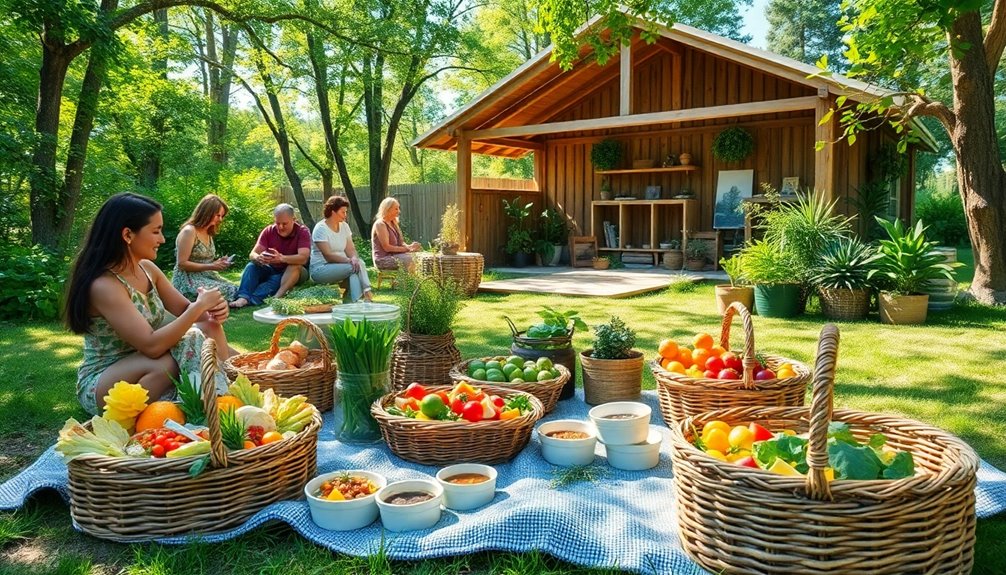At a zero-waste retreat, you immerse yourself in a community focused on sustainability and environmental education. You'll explore carefully chosen venues that prioritize composting and recycling. Meals are crafted using seasonal produce, minimizing waste through innovative cooking techniques. Engage in hands-on activities, like guided hikes and waste recovery stations, designed to enhance your understanding of eco-friendly practices. Instead of traditional trash cans, you'll find structured waste disposal systems to encourage mindful habits. You won't just learn; you'll actively participate in shaping a better environment. Want to discover more about the unique experiences you'll encounter?
Key Takeaways
- Participants engage in hands-on workshops focusing on sustainable living practices and environmental education led by local experts.
- Meals are carefully planned using seasonal produce, emphasizing root-to-stem cooking to minimize food waste.
- Resource recovery stations are set up to sort and recycle materials like glass, plastic, and organic waste efficiently.
- The venue promotes eco-friendly accommodations and is accessible via public transportation or bike to reduce carbon footprints.
- Community involvement is encouraged through activities like beach clean-ups and interactive sessions on composting and recycling practices.
Venue Selection
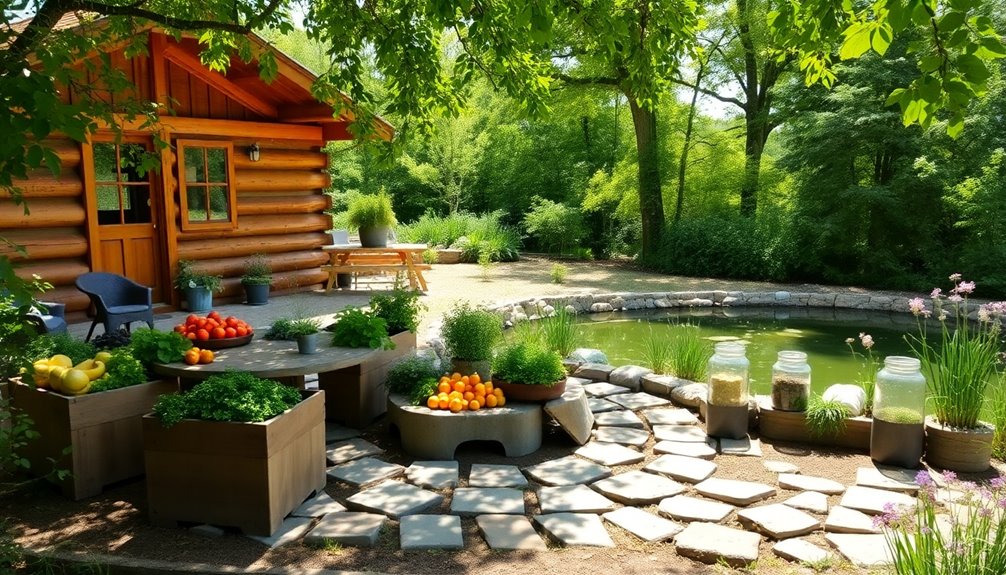
When selecting a venue for your zero-waste retreat, it's crucial to prioritize sustainability from the start.
Look for venues that offer comprehensive recycling and composting services, like designated bins and on-site composting facilities. This helps ensure proper waste segregation and management. Additionally, implementing zero-waste principles can further enhance the event's sustainability efforts.
Assess the venue's past experience with zero-waste events, ensuring they've effective waste management protocols and a commitment to your goals. It's also important that they educate guests on sustainability practices.
Additionally, consider energy-efficient systems and water conservation measures, such as low-flow faucets.
Lastly, choose a location accessible by public transportation or bike, promoting sustainable travel options for all attendees.
Making these choices sets a strong foundation for your zero-waste retreat.
Food-Waste Reduction
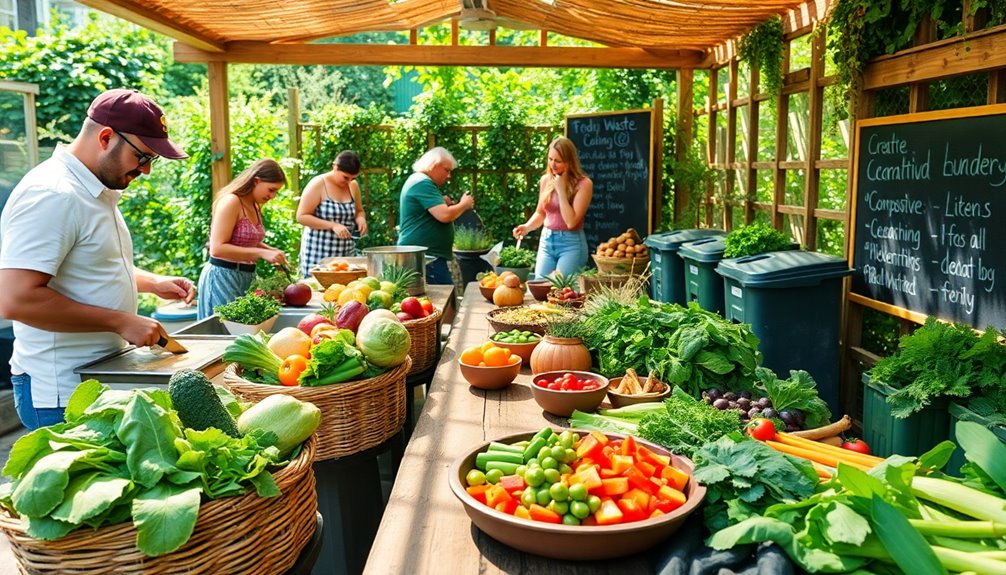
To effectively reduce food waste at your zero-waste retreat, start with careful planning and organization. Create a schedule and inventory system to track food usage, ensuring you only buy what you need.
Shop smart by selecting seasonal produce and checking shelf life. Plan meals around existing ingredients and label leftovers to avoid spoilage. Understanding expiration dates can help you utilize food effectively before it goes bad. Additionally, consider incorporating plant-based ingredients like celery juice powder, which can help minimize waste while providing essential nutrients.
Get creative with your ingredients by using every part—think root-to-stem cooking. Make stock from scraps and turn overripe fruit into puree.
Implement zero-waste strategies by monitoring food waste patterns, adjusting menus, and training staff on sustainable practices.
Resource Recovery Stations
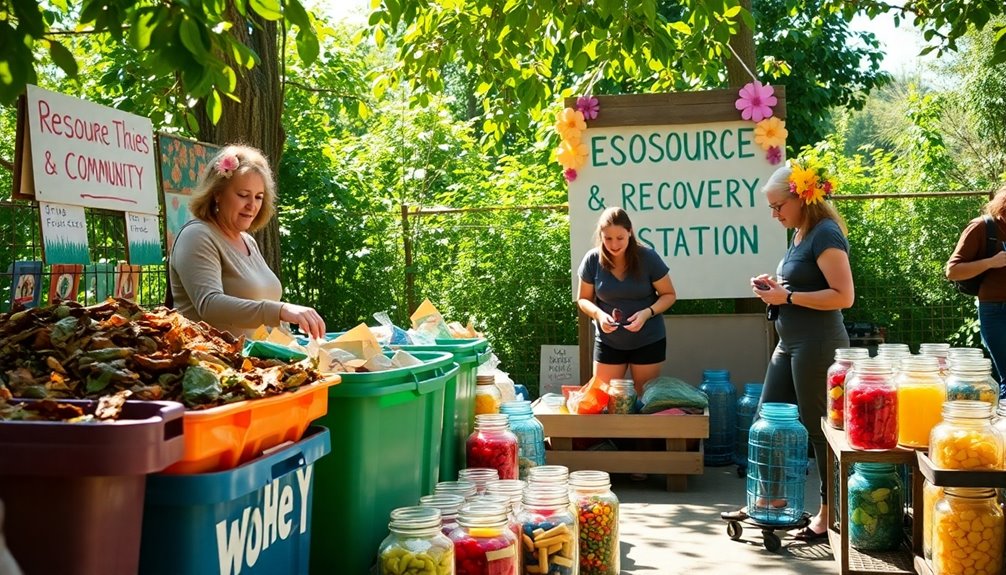
Resource Recovery Stations play a crucial role in achieving zero-waste goals by efficiently managing and processing recyclable materials.
Located in South Lake Tahoe, these facilities sort a variety of materials, including wood, glass, and plastics, using conveyor belts for optimal efficiency. Additionally, the Resource Recovery Facility processes green waste from local agencies at no charge, contributing to the local sustainability initiatives. The emphasis on functional decor in modern design reflects the importance of practicality, which is echoed in these resource recovery practices.
Since their opening in 1995, they've doubled their capacity with the addition of the Resource Recovery Facility in 2009, focusing on wood and yard waste recycling. This not only reduces landfill usage but also supports local sustainability initiatives.
By adapting to market demands and utilizing advanced technologies, these stations promote a vibrant recycling ecosystem. You'll find that community involvement is key, as they accept green waste for composting, further enhancing environmental impact.
Eliminating Trash Cans
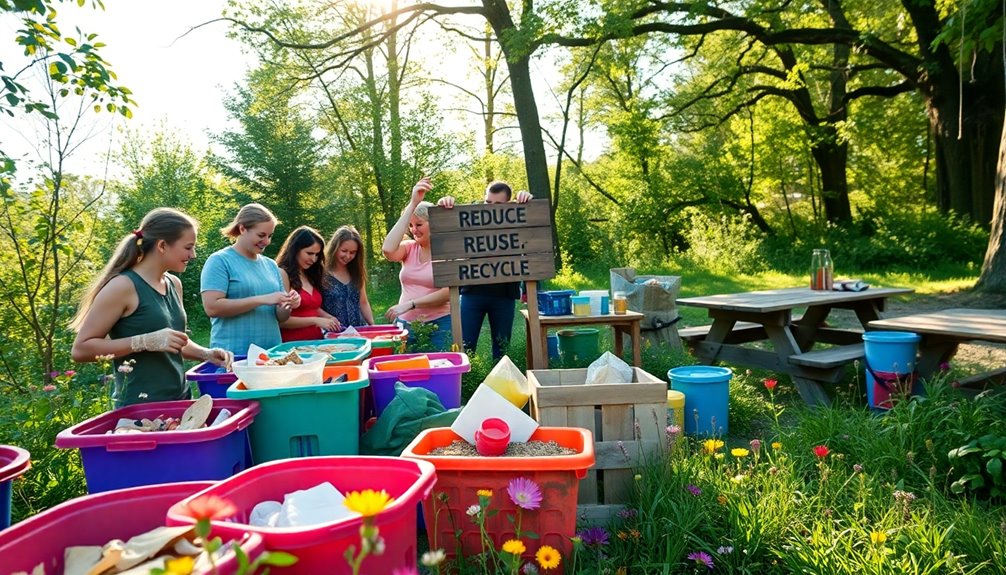
While eliminating trash cans might seem like a bold step toward a cleaner environment, it can unintentionally lead to increased littering and public dumping.
Without trash cans, you might notice more litter on the streets, as seen in San Francisco's attempts to reduce them. Properly placed trash cans with lids are crucial for effective litter reduction, helping keep your community clean. The absence of these cans can also encourage people to use public bins for their private waste, complicating the issue further. Although it might save costs initially, removing trash cans can lead to higher expenses due to increased litter collection and public complaints. In areas with limited trash can access, such as public bus stops, littering often increases as individuals are discouraged from picking up trash without nearby disposal facilities.
Ultimately, maintaining trash can facilities is essential for protecting the environment and keeping your surroundings tidy.
Educational Initiatives
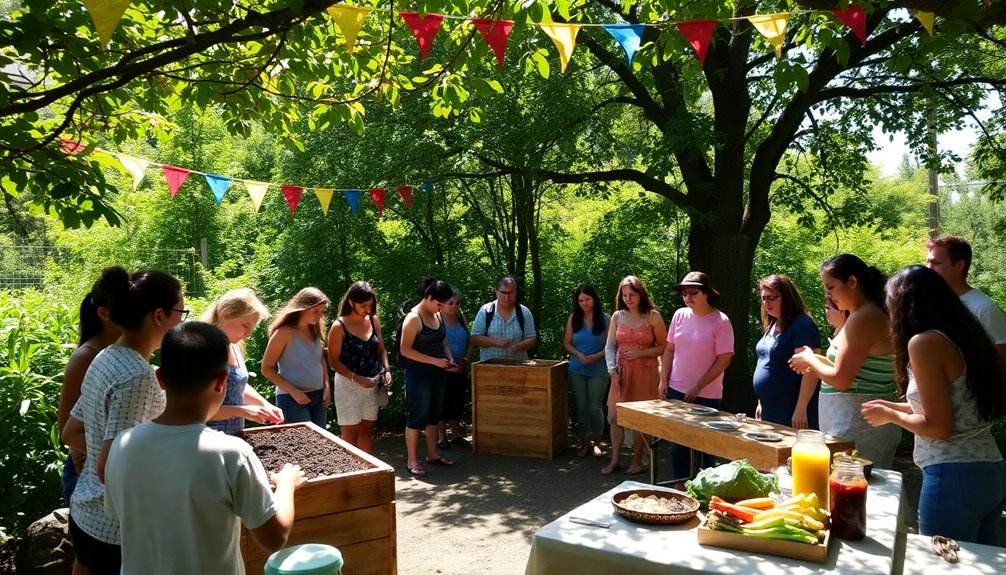
Eliminating trash cans may lead to unintended consequences, highlighting the need for effective educational initiatives that promote sustainable practices.
At a zero-waste retreat, you'll engage in environmental education workshops led by local experts, focusing on sustainable living and wildlife preservation. These interactive sessions encourage hands-on activities, making learning both fun and impactful. Additionally, participants may benefit from recycling system trainings designed to educate on recyclable materials and waste processing.
You can also participate in nature-based activities like guided hikes and beach clean-ups, which deepen your connection with the environment while fostering teamwork.
The retreat prioritizes eco-friendly accommodations and local cuisine, ensuring minimal waste.
Composting and Recycling
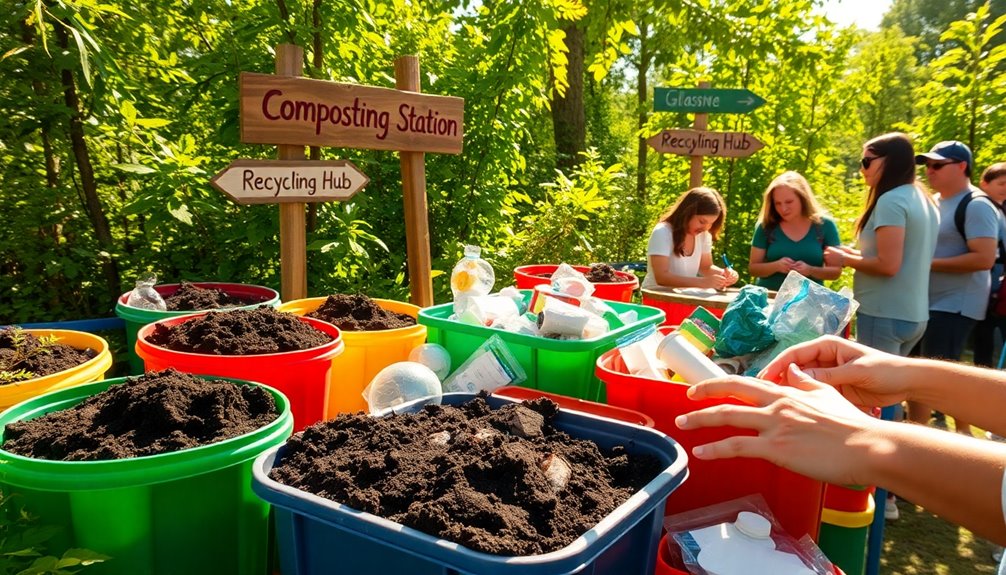
Composting and recycling play a crucial role in reducing waste and promoting sustainability at zero-waste retreats.
You'll discover various composting methods, like vermicomposting, which uses worms to create nutrient-rich soil, and windrow composting, where organic waste is aerated in long rows. Each method has its benefits, from enhancing soil quality to reducing landfill waste. Additionally, industrial composting helps to accelerate decomposition of organic matter on a larger scale, further contributing to waste reduction efforts.
As you engage in these practices, you'll see how composting fits into the circular economy, recycling organic materials back into the soil. Not only does composting lower waste management costs, but it also supports sustainable living.
Frequently Asked Questions
What Activities Are Offered During a Zero-Waste Retreat?
During a zero-waste retreat, you'll enjoy a variety of engaging activities.
You can participate in outdoor events like a bike crawl, beach Olympics, or nature walks, all designed to minimize waste.
Educational workshops will teach you zero-waste cooking and composting basics.
You'll also get involved in community engagement through beach cleanups and local initiatives.
Lastly, you'll focus on personal development by practicing mindful consumption and learning sustainable living tips to reduce your environmental impact.
How Can Attendees Contribute to the Zero-Waste Efforts?
How can you make a real difference at a zero-waste retreat? You can start by packing light, bringing reusable water bottles, and avoiding single-use items.
Know the waste stations and dispose of materials correctly, including composting and recycling.
Engage in workshops and local clean-up activities, and consider upcycling or mending items instead of throwing them away.
Are There Accommodations Available for Different Budgets?
Yes, there are accommodations available for different budgets.
You can choose shared rooms for $80 per person per day during the dry season or $65 during the rainy season.
If you prefer privacy, private rooms cost $95 per person per day, dropping to $80 in the rainy season.
For a more adventurous stay, camping options are available for $70 per night, though they're best during the dry season.
Enjoy your stay!
Can I Bring My Own Food or Drink?
Yes, you can definitely bring your own food or drink!
Many zero-waste environments encourage you to use your own reusable containers, which helps cut down on waste.
It's a great way to enjoy your meals while contributing to sustainability efforts.
Just make sure your containers are clean and suitable for the food or drink you're bringing.
What Happens to the Compost After the Retreat?
Did you know that composting can reduce landfill waste by up to 30%?
After the retreat, the compost undergoes a careful process. You'll find layers of brown and green materials combined, monitored for moisture and temperature.
Regular turning aerates the pile, ensuring efficient decomposition. In about 3-6 months, it transforms into nutrient-rich soil, improving garden health and supporting local biodiversity.
You're contributing to a sustainable cycle that benefits the environment.
Conclusion
At a zero-waste retreat, you're not just escaping; you're stepping into a world where every scrap has a purpose, like a phoenix rising from the ashes. You'll leave with a renewed sense of responsibility, realizing that even the smallest actions can create a ripple effect. Imagine walking through a vibrant forest, each leaf a reminder of your commitment to the planet. Embrace the journey, and you'll carry the spirit of sustainability long after you've returned home.

